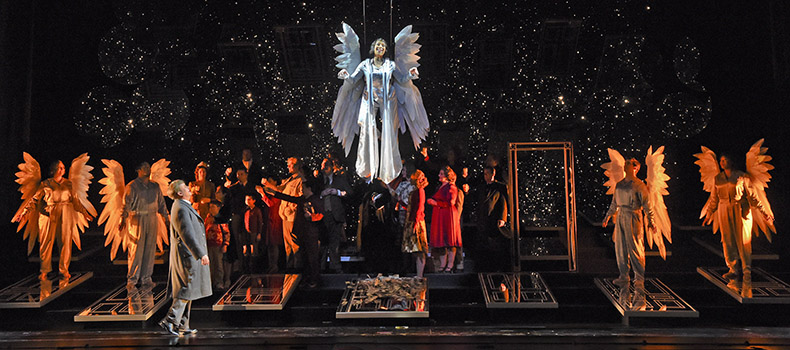November ushers in the holiday season, with its complex set of demands and commitments. For some of the most desperate among us, it's enough to make you jump.

Jake Heggie and Gene Scheer adapted Itís a Wonderful Life for the Houston Grand Opera in 2016, and this season the SF Opera will stage a production. Photo by Karen Almond/Houston Grand Opera
BY PAUL DUCLOS
Published: November, 2018
November ushers in the holiday season, with its complex set of demands and commitments. For some of the most desperate among us, it’s enough to make you jump. The holiday surge in suicides from our most iconic bridge is a testament to this, but even ferries have served as platforms for that final leap. In fact, historians have chronicled this trend going back to the days when the paddle-wheeled Piedmont transported passengers across the Bay in the late 19th and early 20th centuries.
The most persuasive argument against making such as rash decision is that it’s best to stick around for those who need us. Such a premise is key to the enchanting classic It’s a Wonderful Life, the Frank Capra movie adapted from a short story authored by Philip Van Doren Stern.
The story is also being retold in an opera this year, as our own company stages a new production of the It’s a Wonderful Life opera composed by local legend Jake Heggie in 2016. In this exclusive Bay Crossings interview, he describes how he worked with librettist Gene Scheer to make this happen.
Bay Crossings: You have never been one to shy away from tragic themes and stories about mortality (particularly Dead Man Walking and Moby-Dick). But here you’ve taken on a tale dealing with a suicide attempt and conclude with a life-affirming message. Can you describe that personal journey?
Jake Heggie: I think opera works best when there are high stakes and big emotional landscapes. When the Houston Grand Opera asked me to write a holiday opera, I thought about American stories that hadn’t yet been approached as operas but would lend themselves well to the art form. It’s a Wonderful Life jumped out at me. It’s a beloved story and the stakes couldn’t be higher. Plus it holds a universal message about the ripple effect of good deeds and the difference one life can make. It’s a story about community, kindness, generosity, neighbors and family—and just how precious and precarious all that can be.
BC: Tell us something about your collaboration with librettist Gene Scheer. How do you strike agreement on certain aspects of the work, and how do you reconcile differences?
Heggie: Gene is a remarkable collabo-rator because he’s a singer, actor, writer, composer and lyricist. (His gorgeous “American Anthem” was sung by Norah Jones as the theme song for Ken Burns’ documentary series The War.) He’s a deeply good man, with a poet’s soul and an uncanny sense for the unusual pace of the opera stage. For both of us, the journey of creating an opera or a song isn’t about satisfying an ego; it’s about telling that journey the most effective and surprising way we can. Everything is about that. Gene always says: “Before the words and the music is the story.” We’re in synch that way and willing to change, rewrite, cut, redo whatever’s necessary to make sure the story is clearly told. So far, we’ve created about 50 songs and several big operas together, including Three Decembers (2008), Moby-Dick (2010), Two Remain (2016), It’s A Wonderful Life (2016) and our next project, a modern-day Faust story called If I Were You.
BC: We live in a time when there’s once again a great divide in haves and have-nots. How does this version of It’s a Wonderful Life address some of the unbridled greed we have seen surface in our society once again? Is the message still that money can’t buy happiness?
Heggie: Has there ever been a time without the haves and the have-nots? That’s what makes this story universal and timeless. Frank Capra was a genius and recognized that when he made the movie. The circumstances are ever familiar, and the message is eternal: “No one is a failure who has friends.” It’s not about how much money you have. It’s about how you measure true contentment, wealth and happiness in this very precarious world.
Follow Paul Duclos’ Cultural Currents online with his blog at: www.duclosculturalcurrents.com

